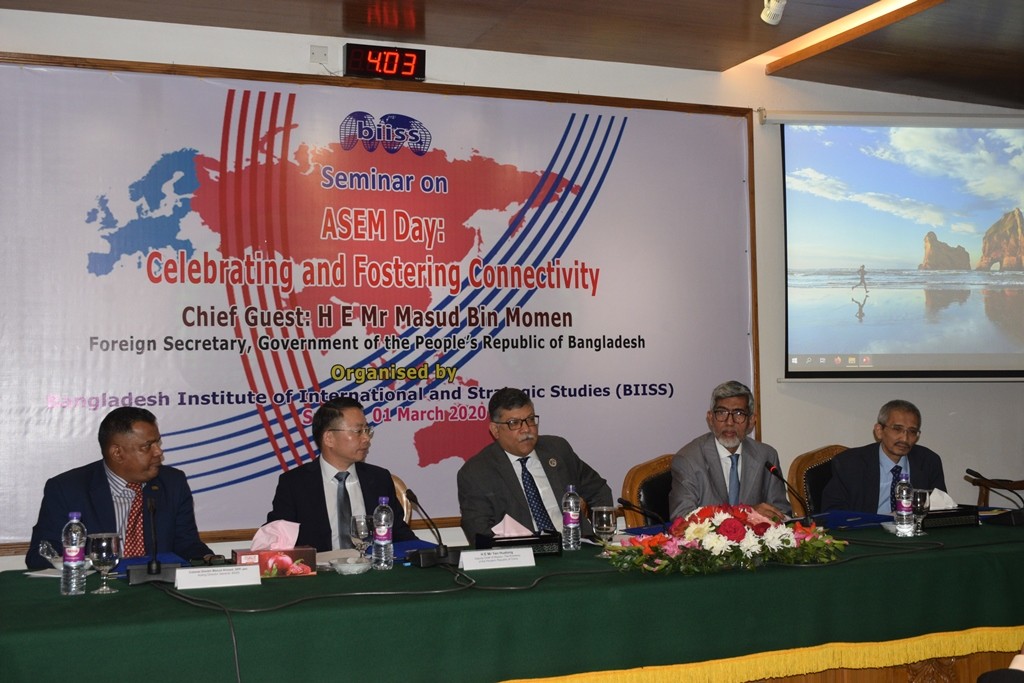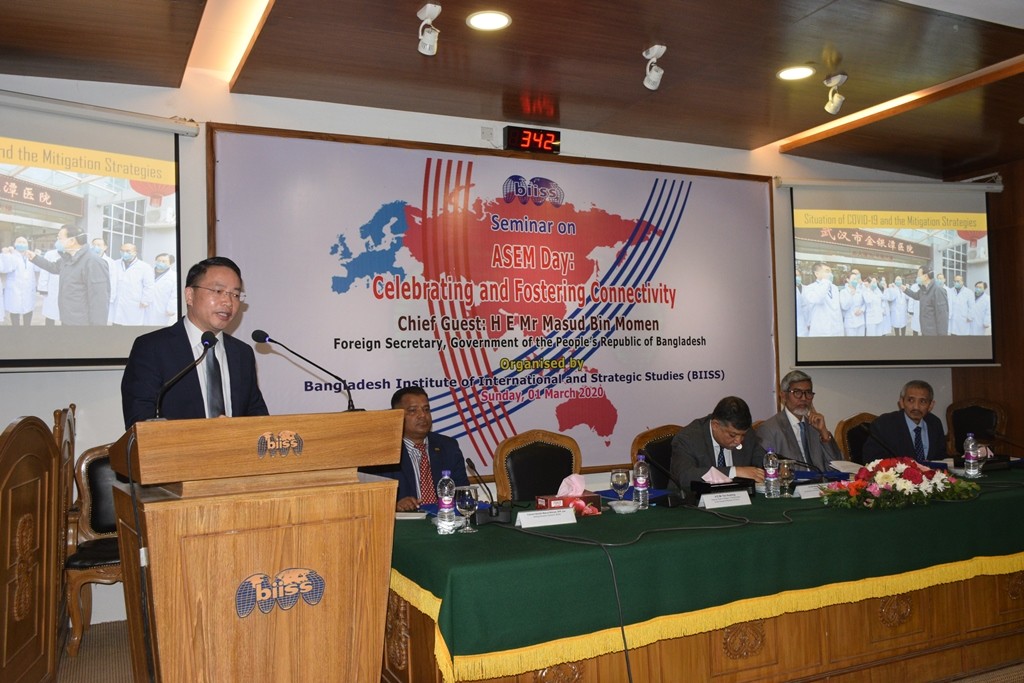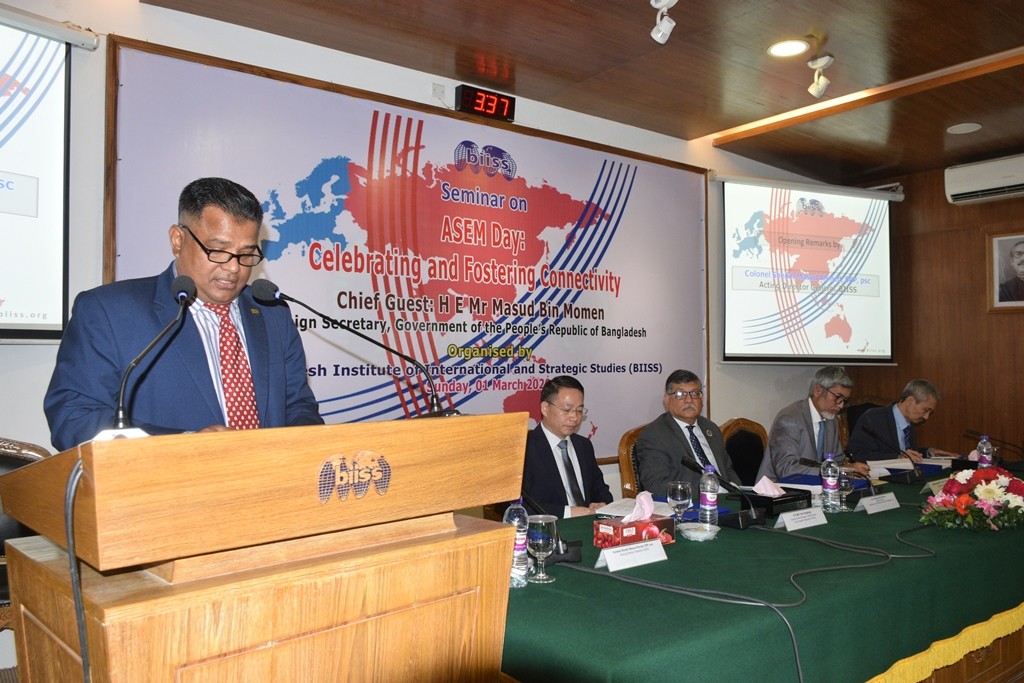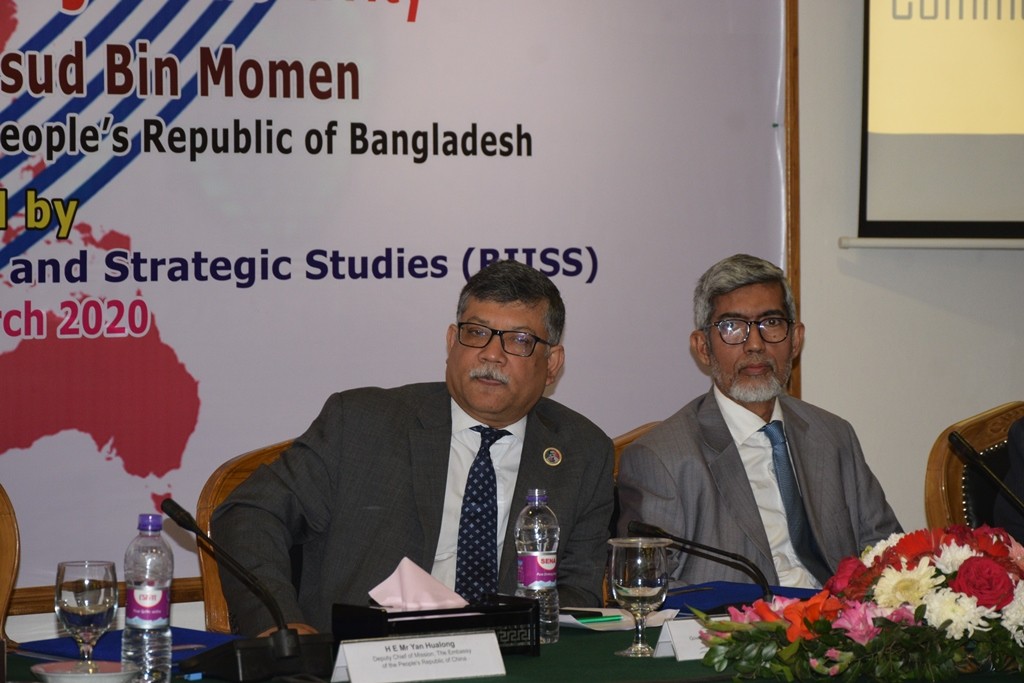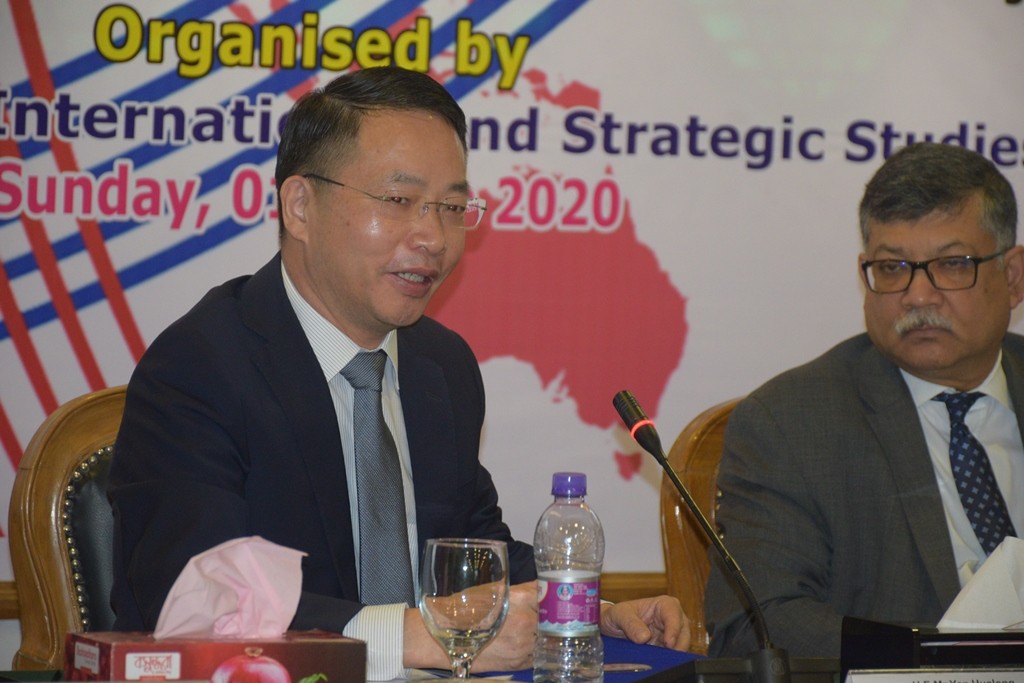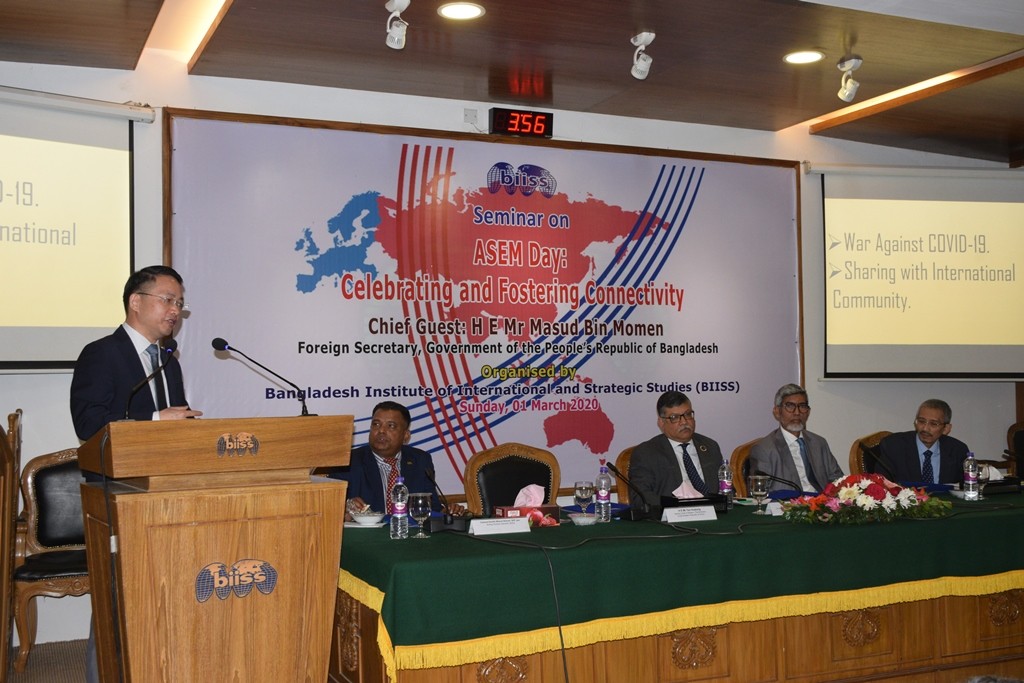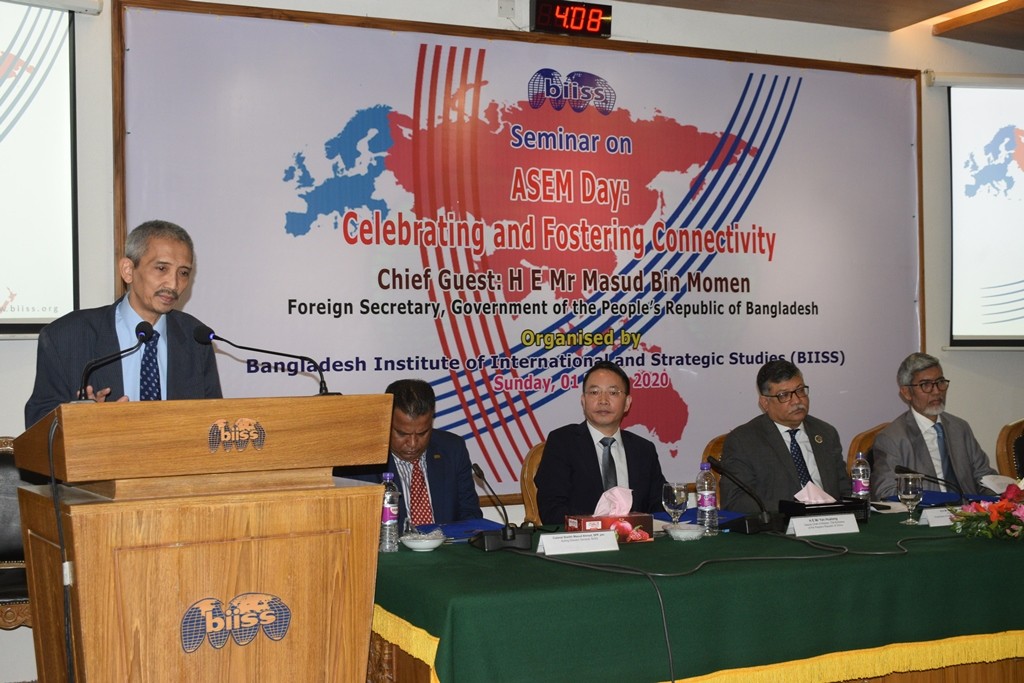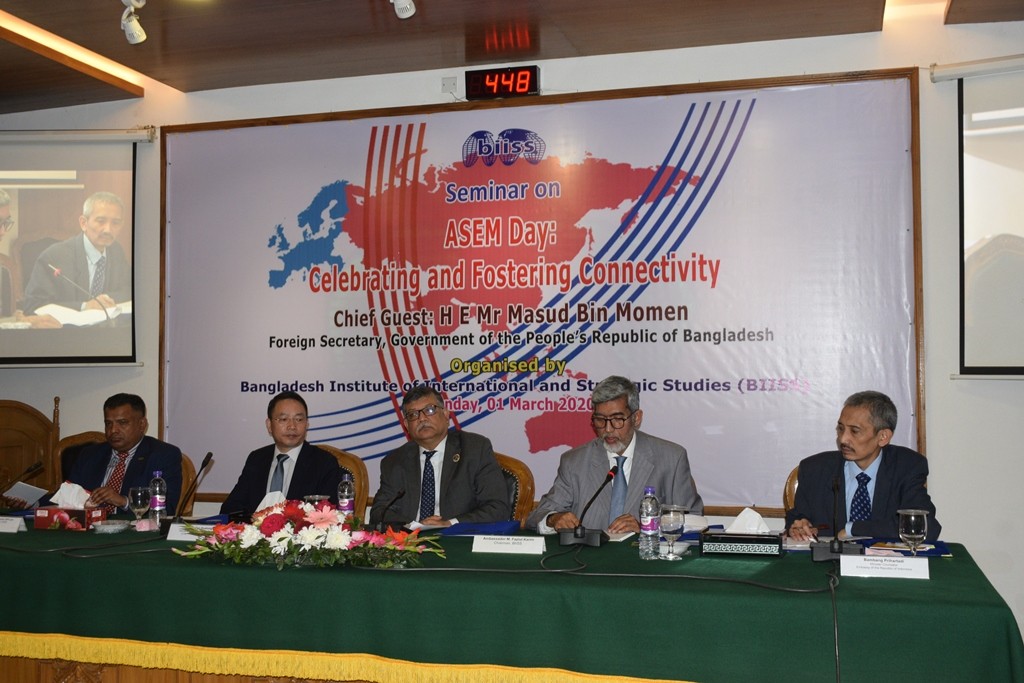Seminar on “ASEM Day: Celebrating and Fostering Connectivity” on 01 March 2020
DATE: 2020-03-01
Bangladesh Institute of International and Strategic Studies (BIISS) organized a seminar on “ASEM Day: Celebrating and Fostering Connectivity” on 01 March 2020 at BIISS auditorium to celebrate the establishment of the Asia-Europe Meeting (ASEM) forum. His Excellency Ambassador Masud Bin Momen, Foreign Secretary of the Government of Bangladesh was present at the seminar as the Chief Guest. His Excellency Mr Yan Hualong, Deputy Chief of Mission of the Embassy of the People’s Republic of China and Mr Bambang Prihartadi, Minister Counsellor of the Embassy of the Republic of Indonesia delivered special remarks at the seminar. The event was chaired by Ambassador M. Fazlul Karim, Chairman, BIISS, while Colonel Sheikh Masud Ahmed, SPP, psc, Acting Director General of BIISS delivered the opening remarks.
In the opening remarks, Colonel Sheikh Masud Ahmed, SPP, psc, the Acting Director General of BIISS said that Asia is the world’s most economically dynamic region, while Europe is the world frontier in innovation and integration. As the interdependence among economies in the two regions is increasingly intensified, the internal need to enhance Asia-Europe connectivity grows stronger. ASEM offers a greater platform to enhance connectivity between the two continents which is inevitable to reap greater advantages and improve peoples’ livelihoods. Moreover, it brings opportunity to explore greater resources, further capabilities, and newer partnerships.
In this presentation, His Excellency Mr Yan Hualong, Deputy Chief of Mission of the Embassy of the People’s Republic of China discussed the recent development of the COVID 19 in China and explained China’s effort to combat this worst epidemic. He shared that China is engaged in a national war against COVID-19 outbreak. After arduous efforts, epidemic control in China is in a scenario of steady improvement. He emphasized that this disease is preventable, controllable and curable. However, he also cautioned that since this virus has no boundary, great caution needs to be taken.
Mr Bambang Prihartadi, Minister Counsellor of the Embassy of the Republic of Indonesia, spoke about the ASEM Interfaith Dialogue initiated by Indonesia and the UK as an example of cooperation within ASEM. He shared that this dialogue engages officials, intellectuals, journalists and various religious leaders and aims to have an understanding between the believers of every religion. He highlighted that containing violent extremism is not only a regional issue but also a global issue. He concluded by hoping that in the next ASEM meeting at Phnom Penh in November 2020, there will be discussion on how to combat global pandemic diseases.
Ambassador Masud Bin Momen, Foreign Secretary of the Government of Bangladesh, in his address shared that ASEM, with its informal structure and the cross-continent platform, provides a unique scope for the 51 countries across Asia and Europe to interact and exchange ideas to jointly work based on effective multilateralism and rules-based international order. He noted that Bangladesh joined ASEM following the guiding principles of its foreign policy as pronounced by the Father of the Nation: “friendship with all and malice towards none”. In 2014, the Prime Minister emboldened the foreign affairs of Bangladesh with her signature policy “broader and deeper engagement with Europe”.
Foreign Secretary Momen stated that Bangladesh is a proud member of ASEM and contributes in a substantive manner for making ASEM a truly productive forum. Bangladesh is a development model that can contribute to the greater success of ASEM. He added that Bangladesh is a substantive member of ASEM not only in the areas of economic and social areas but it is also playing an important role in strengthening the political component as well. Bangladesh is one of the top contributors in terms of peacekeeping and peacebuilding. Bangladesh’s position and actions in ensuring and promoting regional and global stability are appreciated in the international arena. Thus, ASEM will benefit from Bangladesh’s experiences in this regard.
Foreign Secretary Ambassador Masud bin Momen added that Bangladesh seeks support from ASEM’s active members on issues that are important for everyone. Bangladesh has been providing shelter to more than 1.1 million Rohingyas who have fled prosecution in their homeland in the Rakhine state of Myanmar. ASEM has been and should be continuing to support the cause of the Rohingya people. Myanmar is also a member of ASEM. Hence, it is extremely important that ASEM member states create more pressure on Myanmar to create a more conducive environment so that the Rohingyas can return to Myanmar in a safe, voluntary, dignified and sustainable manner. He mentioned that ASEM members have always been sympathetic to the Rohingyas but it is time to take concrete actions to help them.
Regarding the threat of Novel Coronavirus, he reiterated that there is a need to step up efforts to control the spread. Asia and Europe Foundation (ASEF) offered stockpiles equipment to China. Moreover, there is also a need to work together to fight this menace.
Ambassador M. Fazlul Karim, Chairman of BIISS, opined that in the course of almost two-and-a-half decades, despite being an informal dialogue in essence, ASEM has deliberated on an evolving breadth of issues and has endeavoured to bring to the table wide-ranging global priorities. He expected ASEM to focus more on a few issues like connectivity and the non-traditional security threats that bedevil many of our regions. These include forced displacement of people which might threaten peace and stability of our region. He highlighted that the most pressing and alarming non-traditional security concern of today happens to be the epidemic of Novel Coronavirus (COVID-19) that can potentially have disrupting economic and financial impacts across Asia and Europe. He emphasized on the urgency to join hands to overcome this challenge together.
Ambassador M. Fazlul Karim shared that as Bangladesh aspires to become a middle-income country by 2021 and a developed country by 2041, it would require to build stronger partnerships with countries around the globe, especially in Asia and Europe. ASEM could be an important platform to embellish such cooperation and partnership. Bangladesh seeks to engage in mutually-beneficial cooperation, in trade and investment, in security and connectivity related areas. He hoped that ASEM Finance Ministers’ Meeting scheduled to be held in Dhaka this year will further deliberate on these areas.
The seminar was followed by a lively open discussion where senior officials from the Bangladesh government including retired ambassadors, representatives from different foreign missions, businessmen, members of academia, researchers, teachers from various universities and media representatives took part and articulated their observations on the issue. The speakers and participants stressed the need for a strong ASEM to collectively combat deadly diseases such as the novel coronavirus and enhanced connectivity among partner countries.

